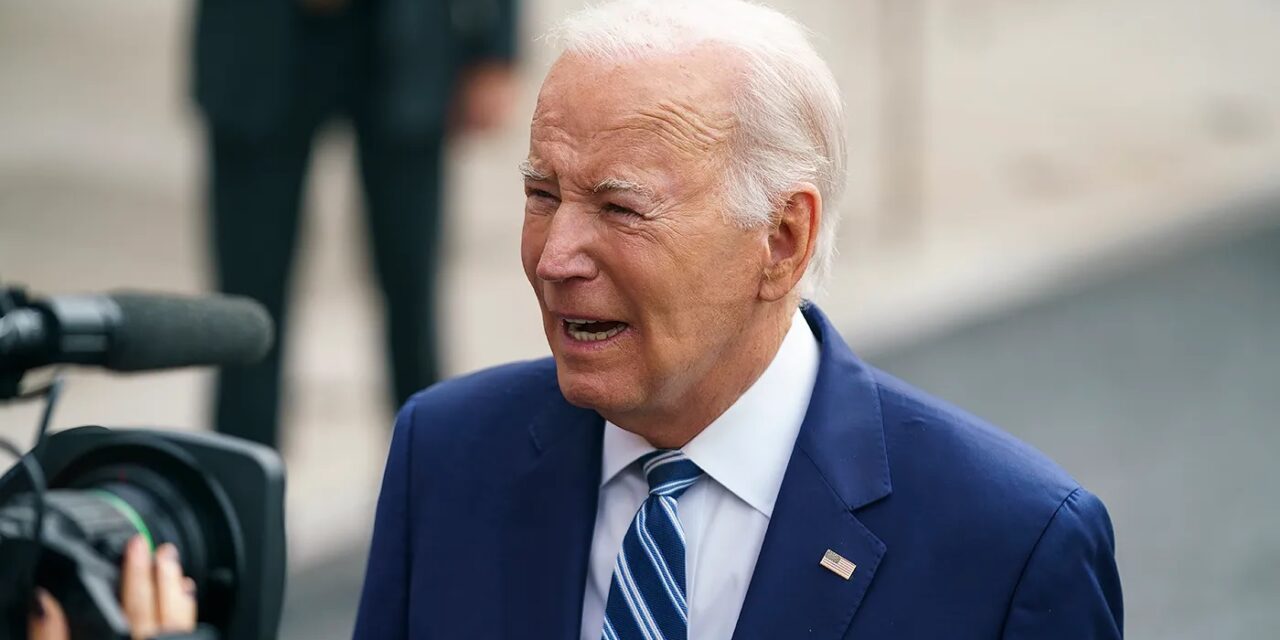Recently, several important supporters of the Democratic Party withdrew their trust from the party's presidential candidate.
Most recently, the granddaughter and heiress of the founder of The Walt Disney empire, Abigail Disney, announced that she would withdraw her support from the Democrats if they did not withdraw Joe Biden. The head of one of the influential Hollywood media companies, the sponsor of the Democrats, Ari Emanuel, and another billionaire donor to the Democrats, Bill Ackman, also blamed the Democrats for the media sympathetic to them for spreading false information about Biden's health.
Although several people have called for it, Joe Biden has said on several forums that he does not want to step down. The Democratic primary is over and Biden has taken the most delegates. In principle, it would be possible to replace Biden if the delegates rebelled, but this does not seem likely.
According to NBC News, an exchange involving a rebellion is almost impossible, which is why no one has ever attempted it. “The party's constitution contains provisions to replace the candidate if the seat becomes vacant. The measure shall be applied in the event of death, resignation or obstruction, and not to replace a person who does not wish to resign"
If Biden were to step down, it doesn't matter when, according to Fox News, "as long as Biden steps aside before August, his delegates will not be tied to him, which means they can vote for anyone." At that time, anyone from the party could run, even someone who otherwise did not run in the primary election. This would mean that the Democratic delegates could decide who the nominee should be in August. According to Fox News, if he were to step down after the meeting (DNC), the narrow leadership of the Democratic Party could practically decide on a new candidate.
In fact, in the Democratic primary process held earlier this year, Biden won the support of 99% of validly voting delegates, which means that he is entitled to the nomination (he would have needed 1,976 delegates to win the nomination, and Biden got 3,894), that is, any other candidate the selection process begins first with Biden himself, i.e. with a clear clarification of his position as a candidate. At the same time, if we look at the political reality, the withdrawal should be announced in the coming weeks, because the sooner it is done, the better from the Democrats' point of view: the more time it takes, the more support a new candidate can gain in public opinion.
If Biden were to be replaced, the most likely scenario would be to launch the current vice president, Kamala Harris, according to seven senior sources familiar with current discussions on the issue in the Biden campaign, the White House and the DNC.
In his case, the advantage would be simplicity, he would easily take over the supporter funds that the president had collected so far together with the campaign structure: with a slight exaggeration, only the name would have to be changed, everything else would continue in the same way. In addition, it is said that as vice-president he has already undergone all national security vetting, his policy is identical to Biden's, that is, neither he nor the voters should be surprised about his person.
The downside is that he is even more unpopular than the president. Even those who argue in favor of it add the sentence "because we have no other option". As one major campaign funder said, "almost no one wants to see him as a presidential candidate, but there's no getting around it."
In a July 2, 2024 Reuters/Ipsos poll, Harris trailed Trump by one percentage point (42% to 43%), a margin well within the poll's 3.5 percentage point margin of error, roughly as strong as Biden.
Some influential Democrats have raised other alternatives to Harris, including popular cabinet members and Democratic governors such as California's Gavin Newsom, Michigan's GretchenWhitmer and Pennsylvania's Josh Shapiro, but avoiding Harris is wishful thinking and would be nearly impossible, said the sources, who did not want to be named.
Much more popular than the Biden-Harris couple is American lawyer Michelle Obama, the wife of former US President Barack Obama, who was the 44th and first African-American first lady of the United States between 2009 and 2017. Already in the fall of 2023, an alternative scenario arose, according to which Michelle Obama would run against Donald Trump instead of Joe Biden.
Cindy Adams, one of the most prestigious American reporters in the New York Post, revealed that Michelle Obama already met with the CEOs of some large hedge funds in New York in the summer of 2022, and then she allegedly announced: "I'm running and I'm asking for their support."
Former Fox News television personality and political commentator Megyn Kelly also weighed in on speculation that Michelle Obama has more political talent than Joe Biden.
The fact that in the event of the president's death, resignation or removal from office, the vice president takes his place was already stated in the original text of the constitution, and this was confirmed by the 1933 twentieth constitutional amendment.
The Democratic National Convention to be held in Chicago between August 19 and 22, 2024 will officially decide the identity of the Democratic Party's presidential candidate. Biden might drop out (withdraw) from the candidate race before the Democratic National Convention, the party delegates participating in the event can vote for a new candidate. Biden's voluntary withdrawal would be the simplest, in which case anyone from the Democratic Party could run, even someone who otherwise did not run in the primaries.
An earlier example was when in 1968 Lyndon B. Johnson, the president at the time and the candidate of the Democratic Party, resigned in this way.
According to Rule 13, Section J of the Democratic National Committee's (DNC) delegate election rules, "delegates elected to the national convention who have pledged themselves to a candidate for president shall in good conscience reflect the sentiments of those who elected them."
Biden may choose to reject the virtual nomination and line up delegates to choose a new nominee at the Democratic Party convention, where delegates will still participate in a traditional roll call.
In the event that Biden drops out of the race against Trump after the party convention in August, an extraordinary meeting of the DNC members would decide on the new candidate. The DNC is made up of about five hundred senior party members from every state in the United States and is considered one of the Biden rivals, Whitmer, who has been governor of Michigan since 2019, is one of the three vice chairs of the DNC.
If Biden were to withdraw after the official nomination, the following rules would apply. According to Rule 8, Article G of the rules governing the convening of the Democratic National Convention, if the candidate for President and/or Vice President dies, resigns, or becomes incapacitated after the convention, “the national chairman of the Democratic National Committee shall consult with the Democratic leadership of the United States Congress and the Democratic with the Governors Association and shall then report to the Democratic National Committee, which shall be authorized to fill the vacancy or vacancies.”
Once the nomination has been decided at the convention, only the nominee can choose to withdraw. The party cannot do that. The party may change their mind about their nominee, but if Biden refuses to back down, there isn't much they can do except put extreme pressure on him.
Biden could be removed by declaring him ineligible. Johnson, the Republican Speaker of the House of Representatives, stated that members of President Biden's cabinet should consider using the 25th Amendment to the Constitution to remove Biden from office.
Article 2, Section 1 of the Constitution of the United States of America (Constitution) already stated that in the event of the President's removal from office, death, resignation, or inability to discharge the powers and duties of the office, the discharge of the powers and duties of said office devolves upon the Vice President. This was confirmed by the 20th amendment to the Constitution.
The 25th amendment to the Constitution, which entered into force in 1967, is intended to regulate what should be done if the position of president or vice president becomes vacant before the end of the term of office. According to this amendment, if the president becomes unfit (for example, in the case of Joe Biden, due to his mental state) to hold the office of president, there are two possibilities:
According to Article 3 of the amendment, if the President sends a written statement to the President of the Senate and the House of Representatives that he is unable to perform the powers and duties arising from his office, as long as he does not send them a written statement to the contrary, the Vice President acts as Acting President these powers and duties. Pursuant to Article 4 of the amendment, if the vice-president and the majority of the government or another body determined by law by Congress notify the president of the Senate and the House of Representatives in writing that the president is unable to perform the powers and duties arising from his office, the vice-president shall immediately take over from his office resulting powers and duties as acting president.
After the case according to Article 4, if the President declares in writing to the President of the Senate and the House of Representatives that the factors hindering him in his office have been removed, the President continues his official powers and duties, unless the Vice President and the majority of the government or the Congress another body defined by law shall send a written statement to the President of the Senate and the House of Representatives within four days that the President is unable to perform his official powers and duties. After that, the Congress will decide on the issue and for this purpose will meet within forty-eight hours if it is not in session.
If Congress, within twenty-one days after receiving the latter written statement, or if Congress is not in session, within twenty-one days after the convening of Congress, determines by a two-thirds vote of both houses that the President is unable to perform the powers and duties arising from his office, the Vice-President shall continue provides for them as Acting President; otherwise, the president continues to perform the powers and duties arising from his office.
Featured image: Greg Nash / The Hill













